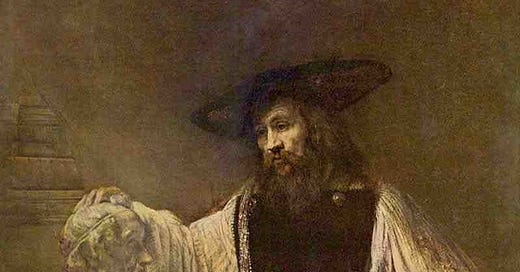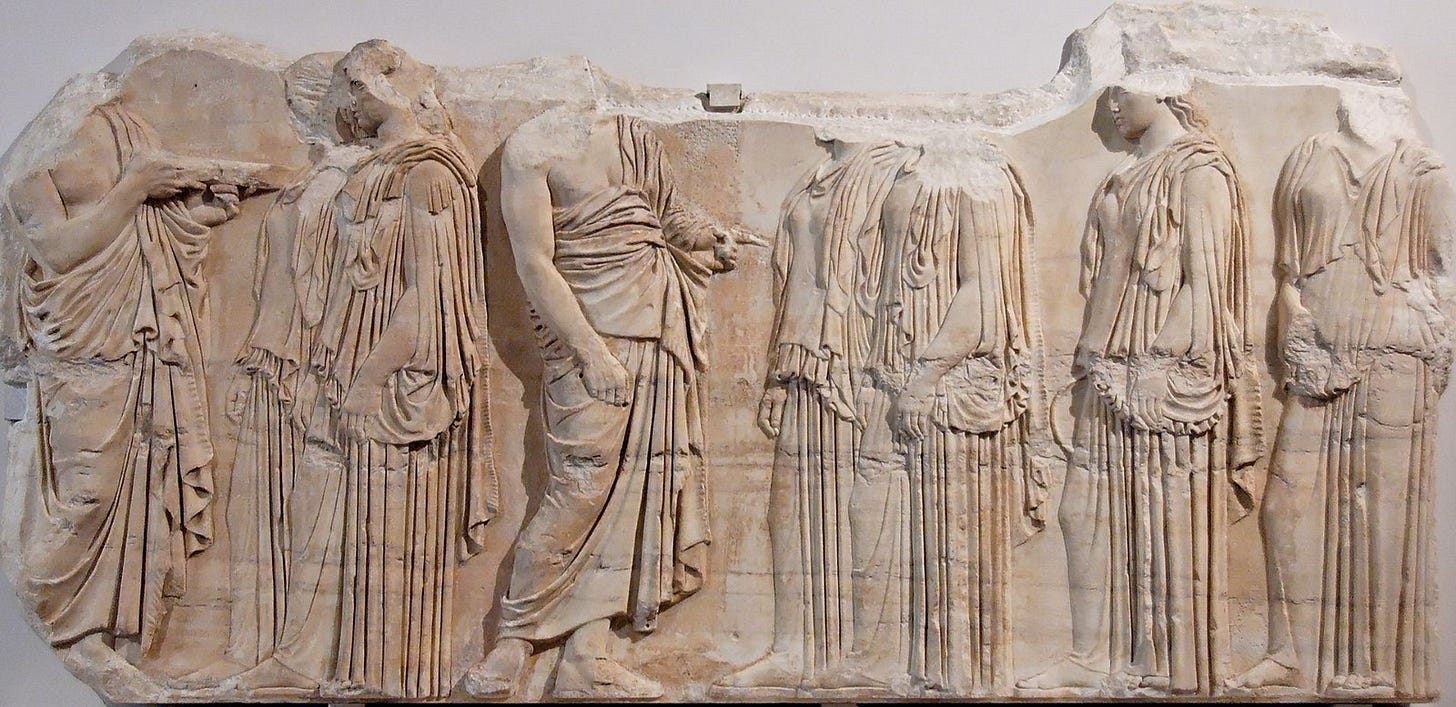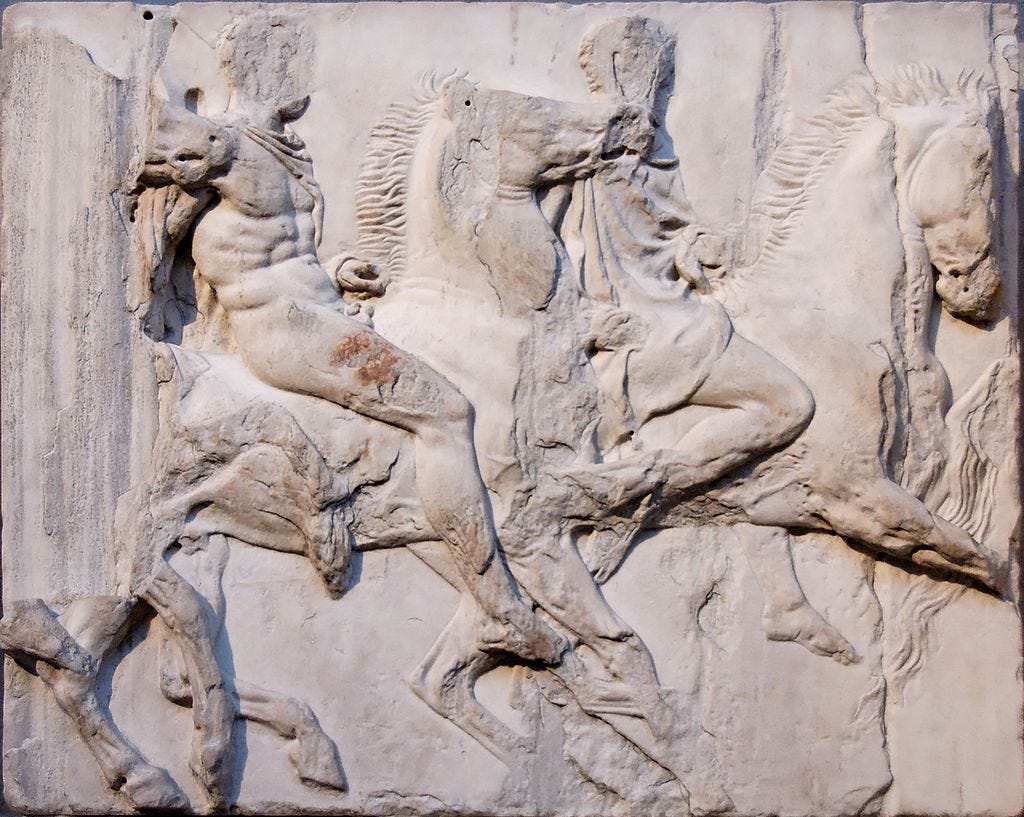Featured in New Lyre - Winter 2024
All great art has a naturally hypnotic power. Poetry’s lyrical and musical forms of expression have entranced human civilizations for millennia. Even today’s modern “pop” songs are by-and-large distillations and formalizations (often superficial) of earlier classical and lyrical modes of poetic expression. Take the ancient Greek poets like Sappho, Arion and Stesichorus: their verses were accompanied with a musical instrument like the lyre or kithara. From these arts arose the tradition of the lyric song, as in words accompanied by the lyre. Or consider the Ancient Greek dithyrambs, the ecstatic hymns sung and danced in honor of the god Dionysus, and accompanied by the aulos. Whether epic, lyric or dramatic forms, many of our most common modern musical modes of expression are ultimately derivations and adaptations of these earlier classical traditions.
Today, anyone hearing a pop song can observe its seemingly magical ability to induce what hypnotists call “altered states.” We drive to work, clean or spend time with friends and family while music breathes life into the overall moment and allows us to access a world of emotion—one which everyday waking consciousness usually forbids. These quasi-hypnotic states of musical suggestion may cause us to feel things we may or may not wish to feel, to relate thoughts and emotions in new or impassioned combinations or solidify with words and rhythms what may have otherwise been a passing, half-waking fancy.
While many of us may hear the word hypnosis and imagine some cartoonish or Hollywoodian Clockwork Orange-style character being force-fed messages in front of a giant screen, the trance-like qualities of poetry and song have always been there. Plato recognized this going back to the times of Ancient Greece, where he keenly observed poetry’s power over the hearts and minds of Greek citizens. In his Republic, he was explicit about the seemingly magical effects invoked by the imagery of the poets, and how this largely shaped the psycho-cosmological matrix of Greek civilization, from its origin stories and gods to its exemplars of virtue and wisdom.
Indeed, we can observe that whether in the case of the martial and warlike spirit of Homer’s Iliad or the Dionysian fervor of the 1960s Beat and counterculture generations, music and poetry have tended to reflect the emerging or dominant images of man. But one could go further and argue that in many ways these musical trends often shape the images themselves. For instance, consider the “Gallup-poll” effect: the ostensible goal is to provide people with information concerning what the population generally believes or feels, however, opinion polls in and of themselves subtly shape public opinion and belief by signaling “this is what most people believe or desire.” The effect is to legitimize certain issues or positions, frame the ostensible choices related to various issues, and leverage people’s inborn tendency to rely on “the group” as an authoritative source for information and ideas.
However, music and poetry may be said to operate in even subtler ways. They not only suggest various ideas and worldviews, the music and rhythms signal how one might think or feel about a given set of experiences or beliefs. Whether the question of fighting a war or wooing a mate, music, art and poetry largely place us in those altered states of affectation which cause us to emote with a subject or object. They do so without any direct or explicit order, but by altering our emotional states in respect to various experiences and ideas. In a word: music and art cause us to feel; and these feelings lead to thoughts.
Naturally, these altered states say little regarding whether the dreams we dream are good dreams, or if they might turn out to be nightmares somewhere down the road, or whether the thing desired is even the real thing, rather than some clever imitation. Having observed the people of Ancient Athens and its neighboring city states, Plato was wise to this reality. For this reason, he pointed out that no sound leader of any society intent on creating a lasting civilization could overlook the power of song and poetry—and ultimately culture—over its citizens. What one might do about the situation is a different story, but that culture is indeed downstream from politics was obvious to Plato over 2000 years ago, as it should be for us today.
So, Plato in his Laws spoke of songs and poetry as “charms” which exerted an alchemical-like quality over the populace, especially its young people. The effect was to create visceral experiences which promoted certain desires or emotions, upholding specific narratives while discounting others. Whether in Plato’s Republic, Laws or Western civilization today, no ruling power ever takes the artistic trends and messages they convey lightly.
And neither should we today.
The Poetics of Truth?
The purpose of it is to lead young people of ability, and perhaps older people too, gradually, with Reason for our guide, from the things of sense, to God, in order that they may cling to Him who rules all and governs our intelligence, with no mediating Nature between. ... It is the ascent from rhythm in sense, to the immortal rhythm which is in truth.
—St. Augustine - De Musica
In his Republic, Plato famously teased out the paradox of what a society intent on its lasting survival would do regarding the state of its poetry and literature—the lifeblood of its culture. So, he playfully asked whether one should or should not allow the poets into his ideal republic, given their charming power over the populace. For, who were the poets of Ancient Greece if not the chief “image-makers” shaping the population’s understanding of its gods, genealogies, their foundational myths and self-image? What happens to a society on a macroscale when these deeply felt emotional bonds and images are incorrect, misleading or subversive?
While virtually always reduced to the binary question of whether Plato came down on the side of censorship in an ideal society—and always overlooking his later and more mature dialogues (such as The Laws)—most modern scholars and critics have tended to obscure the deeper theme running throughout Plato’s countless thought-experiments—known as his “dialogues.”
Ultimately, all of Plato’s dialogues hinge on the question of how an ideal society might distinguish between the real thing i.e. Goodness, Truth and Beauty vs. their imitations, that is, things that might sound or appear Good, Beautiful and True (or perhaps offer one without the others) but lead to something other than the genuine real thing. Whether in respect to the question of art, Justice, Truth, Beauty, the question would ultimately come down to whether the real thing, or merely clever imitations would govern that society’s system of laws, customs and culture.
So, Plato in his Republic offered his famous parable of the shadows on the cave wall. The denizens inhabiting the world of opinion— “doxa”—were the cave-dwellers largely beholden to their immediate sense-perceptual apprehension of reality, from which they derived their view of what’s what. These were the democratic souls and oligarchical souls, the latter controlling the shadows adhered to by the former.
While a formalistic definition of poetry might reduce poetics to a mere question of technical forms and quantifiable elements, as Aristotle’s Poetics does, poetry per se can never and should never be reduced to any of its formal elements, lest we mistake the forest for the trees. For instance, Plato’s metaphor of the shadows on the cave wall is itself a supremely poetic metaphor which suggests a transcendent reality that can never be known directly, but always indirectly, through poetry.
For this reason, Plato consistently relied on rich metaphors and paradoxes throughout his dialogues, rather than literal or descriptive prose. From this standpoint, while Plato is often cast as a character who viewed poetry as a subversive force in society, the irony not lost on any careful reader is that Plato’s dialogues were themselves supremely poetic and playful. The poet Percy Bysshe Shelley recognized this when he observed the following in his “Defence of Poetry”:
Plato was essentially a poet—the truth and splendor of his imagery, and the melody of his language, are the most intense that it is possible to conceive. He rejected the measure of the epic, dramatic, and lyrical forms, because he sought to kindle a harmony in thoughts divested of shape and action, and he forebore to invent any regular plan of rhythm which would include, under determinate forms, the varied pauses of his style.
For, what is the purpose of poetry if not the reaching after some transcendent reality beyond the scope of our literal or immediate perception? And if it’s not, one might ask why even compose or read poetry in the first place? Why not just say things outright or give some literal description? The existence of poetry is itself a testament to the fact that there is something else, and that this something else requires its own particular mode of expression, namely, metaphor. Through this mode of transcendent expression, mankind is able to work out the meaning of things beyond their surface level, unearth new insights and preserve a people’s precious wisdom in its most memorable forms.
On the other hand, if the purpose of poetry were merely to entertain, feel intensely or express some personal subjective experience, it would essentially be no different than any other Hollywood film or melodrama. Homer’s Iliad and Odyssey would simply be an ancient version of modern Marvel movies; Sappho’s sublime lyrics would simply be a kind of old-school Taylor Swift love song. In reality, what gives any genuine poetical work its title as poetry proper is its ability to transcend any given literal or personal experience and unearth the universals underlying any set of ostensible particulars or opinions.
So, Shelley writes:
The poet participates in the eternal, the infinite, and the one; as far as relates to his conceptions, time and place and number are not. The grammatical forms which express the moods of time, and the difference of persons, and the distinction of place, are convertible with respect to the highest poetry without injuring it as poetry; and the choruses of Aeschylus, and the book of Job, and Dante’s “Paradise” would afford, more than any other writings, examples of this fact, if the limits of this essay did not forbid citation. The creations of sculpture, painting, and music are illustrations still more decisive.
Percy Bysshe Shelley – A Defence of Poetry
How does one achieve any kind of transcendent insight if not by some poetical conceit? Whether the Psalms of David or the verses of Paul’s epistles, the choruses of Aeschylus or lyrics of Sappho, Shakespeare’s sonnets or Keats’ odes, the reaching after any kind of transcendent natural law or spiritual reality requires some form of poetical expression. As the Renaissance literary giant Boccaccio surmised, poetry likely originated as man’s attempt to express the divine in some utterable form. Indeed, virtually every sacred text and timeless work of art seems to attest to this reality. Take, for instance, observations by the former poet laureate of California Dana Gioia. In his “Poetry and Christianity,” he points out that a poetic tradition was central to the spread of Christianity across the Western world, writing:
No believer can ignore the curious fact that one-third of the Bible is written in verse. Sacred poetry is not confined to the Psalms, the Song of Songs, and Lamentations. The prophetic books are written mostly in verse. The wisdom books—Proverbs, Job, and Ecclesiastes—are all poems, each in a different genre. There are also poetic passages in the five books of Moses and the later histories. Prose passages suddenly break into lyric celebrations or lamentations to mark important events.
On this question, Shelley writes the following in his “Defence of Poetry”:
It is probable that the poetry of Moses, Job, David, Solomon, and Isaiah had produced a great effect upon the mind of Jesus and his disciples. The scattered fragments preserved to us by the biographers of this extraordinary person are all instinct with the most vivid Poetry.
Ultimately, the purpose of Plato’s poetical “dialogos”—like all great poetry—was to lift the mind above the apprehension of mere particulars—from the Many to the One. This transcendent One would then allow us to see the Many in a new light.
Allowing the Poets into the Republic?
Rather than a series of discreet and quantifiable particulars in time, reality for Plato was a series of timeless principles and poetical paradoxes, which had to be confronted and resolved by any mortal wishing to arrive at some meaningful conclusion regarding the nature of the Good, the True and the Beautiful. Doing so would allow one to not merely imitate outward forms or display a set of opinions, whether “orthodoxia” (correct opinion) or false ones, but to embody these timeless principles in time—to bridge the world of the One and the Many. Plato posited that the ability to recognize such transcendent Truth, rather than its mere imitations, would ultimately decide whether any just and good socio-political-cultural system could be built and preserved across the ages, lest it be destroyed by the ebbs and flows of fortune and opinion.
While Aristotle’s Poetics contained a mere one paragraph on the question of truth in poetry and its ability to represent the real thing in society, Plato dedicated several books, including the concluding book of The Republic and second book of The Laws, among others, to this question.
Quite famously, Plato in his Republic playfully comes for Homer himself, the prince of poets. He does so by calling into question Homer’s representation of Goodness, Truth and Beauty as embodied in the representations of gods, heroes, their origins and struggles. For, the Homeric heroes could be characterized as individuals in the pursuit of honor and glory, represented as legended Bronze Age warriors and the often-fickle gods whom they served. From Plato’s standpoint, while the treatment of such stories by the poets may have been compelling or true in certain respects, they could still be merely artful “imitations,” and be misleading in other respects. Hence, Plato’s playful prodding concerning poetry’s prospects in his ideal republic.
In Book X of his Republic, Plato begins to tease out his question in following manner:
...must we not infer that all these poetical individuals, beginning with Homer, are only imitators; they copy images of virtue and the like, but the truth they never reach? The poet is like a painter who, as we have already observed, will make a likeness of a cobbler though he understands nothing of cobbling; and his picture is good enough for those who know no more than he does, and judge only by colours and figures.
Quite so.
In like manner the poet with his words and phrases may be said to lay on the colours of the several arts, himself understanding their nature only enough to imitate them; and other people, who are as ignorant as he is, and judge only from his words, imagine that if he speaks of cobbling, or of military tactics, or of anything else, in metre and harmony and rhythm, he speaks very well—such is the sweet influence which melody and rhythm by nature have. And I think that you must have observed again and again what a poor appearance the tales of poets make when stripped of the colours which music puts upon them, and recited in simple prose.
Yes, he said.
They are like faces which were never really beautiful, but only blooming; and now the bloom of youth has passed away from them?
Exactly.
Here is another point: The imitator or maker of the image knows nothing of true existence; he knows appearances only. Am I not right?
Yes.
Here, Plato plays with the idea that just because one can paint compelling images or pleasing scenes that appear true to experience of the world, and feel true, that in and of itself is not a standard for Truth. For, the images we create, however beautiful, may or may not be representative of reality. In Plato’s terms, they could be rooted in genuine knowledge (episteme) or merely opinion (doxa). This is no different than suggesting that just because one has had only pleasing or positive experiences with an individual, that this individual is therefore a good person or holds good, true and beautiful ideas. For, many considered Jesus himself to simply be a subversive rabble rouser calling into question the Laws, and many considered Socrates as simply a good talker skilled at confusing clever sophists. In both cases, opinion ruled that these figures were better off put to death. For Plato everything came down to the question of how a society might move beyond the realm of opinion and finally “exit the cave.”
So, our positive or negative affectations towards any given person or images may or may not be indicative of what makes a genuinely good or intelligent person in the same way that the collective opinions of a society in respect to what is Good, True and Beautiful may or may not be in line with what actually is Good, True and Beautiful. Unless one sought and desired to know the real thing, Plato observed that individuals and society would ultimately remain the inhabitants of the realm of “doxa” i.e. beholden to the shadows on the cave wall. And that meant that the oligarchs and plutocrats would continue to be the ones manipulating the shadows and shaping the narrative matrix of the age until, of course, that society came apart—and the tyrants came in to restore “order.”
Keep reading with a 7-day free trial
Subscribe to Age of Muses to keep reading this post and get 7 days of free access to the full post archives.






